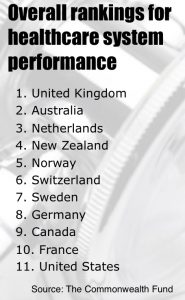New study shows U.S. ranks last among industrialized nations on access to quality healthcare
by August 1, 2017 1:40 pm 1,392 views

There is some truth to the adage money can cure many ills, but it can’t always buy healthiness. The United States spends more on healthcare than nearly a dozen other countries examined in recent study by The Commonwealth Fund.
Despite healthcare accounting for roughly 17% of the nation’s Gross Domestic Product the U.S. ranked last out of 11 industrialized countries in the study in terms of providing equal access to quality health care regardless of income. National health spending is projected to grow at an average rate of 5.6% per year through 2025, and 4.7% per year on a per capita basis, according to the Centers for Medicare and Medicaid Services.
Commonwealth said its study is the only survey data to date that measures and compares patient and physician experiences across wealthy nations like the U.S.
“What this report tells us is that despite the substantial gains in coverage and access to care due to the Affordable Care Act, our healthcare system is still not working as well as it could for Americans, and it works especially poorly for those with middle or lower incomes,” said Commonwealth Fund President Dr. David Blumenthal. “The healthcare policies currently being contemplated in Congress would certainly exacerbate these challenges as millions would lose access to health insurance and affordable healthcare.”
Blumenthal said 7% of those in the United Kingdom with lower incomes and 4% with higher incomes reported that costs prevented them from getting needed healthcare. This presented a 3% gap between those two diverse income levels. In the U.S., he said 44% of lower income and 26% of higher income people reported financial barriers to care.
“Remarkably, a high-income person in the U.S. was more likely to report financial barriers than a low-income person in the U.K.,” Blumenthal noted in the survey. “The U.S. spent $9,364 per person on healthcare in 2016, compared to $4,094 in the U.K., which ranked first on performance overall.”
He said the U.S. is also the only one of the 11 higher-income countries that does not offer universal health insurance.

The U.S. ranks last overall on health care outcomes. Compared to other countries, the U.S. comes in last on infant mortality, life expectancy at age 60, and deaths that were potentially preventable with timely access to effective healthcare, according to the study.
The report noted some bright spots for the U.S. as it performs relatively well on certain clinical outcomes, such as lower in-hospital mortality rates for a heart attack or stroke, and is a top performer in breast cancer survival. Observations made by the Dr. Eric Schneider, lead researcher for the study, indicate the highest performing counties in the study have universal coverage that allows people to get the care they need at little or no cost.
The the study found the U.S. leads the world when it comes to time spent dealing with the requirements of our cumbersome health insurance system, Blumenthal said. Reducing the administrative burden would give countless hours back to patients, caregivers, and physicians while also making the system easier for people to navigate, he said.
More than half (54%) of U.S. doctors reported problems trying to get their patients needed treatment because of insurance coverage restrictions. In Norway and Sweden, which rank first on this measure, only 6% of doctors reported this problem.
The Commonwealth Fund advocates more investments in social services to help reduce disparity because there are a number of factors behind traditional healthcare such as housing, education, nutrition and transportation that can have an effect on people’s health. He said investing in services that provide support in these areas can make the U.S. population healthier as a whole and reduce health care costs.
The four main problems weighing heavily on the U.S. healthcare industry include:
• Growing number of uninsured;
• Limited primary care;
• Administrative burdens; and
• Disparities in care between higher- and lower-income patients.
Blumenthal said U.S. Congressional do not address problems with the Affordable Care Act. He said the major issue of simplifying the insurance system has been off the table and yet it is part of the problem.
The recent Gallup-Sharecare Well-Being Index indicates the number of U.S. adults without health insurance has increased roughly 2 million this year, from 11.7% in the second quarter compared with 10.9% to start the year. The losses of insurance coverage has been concentrated on younger adults and people buying their own plans. Over the past six months Gallup found uninsured rate rose 1.9% among adults between the ages of 18 and 25 and 1.5% for those aged between 26 and 34.
Dr. Joe Thompson, former Arkansas Surgeon General and now CEO of the Arkansas Center for Health Institute, said during a recent interview with Talk Business & Politics the solution will require figuring out how to get all Americans covered regardless of age, income of geography. He said healthy people have to buy into the program and purchase insurance to help balance out the pools which have largely been comprised of sick people since Obamacare was mandated. Thompson said too many of the healthy people did not buy insurance and unless the replacement of Obamacare addresses this absence the insurance marketplace cannot be stabilized and insurance premiums will continue to rise.
Thompson predicts marketplaces will continue failing because of the imbalance of the healthy and unhealthy participants. He said this leaves Congress with no choice but to act. If the Medicaid expansion is cut, more than 300,000 Arkansans who obtained insurance through the private option or Arkansas Works will lose their coverage. On a national scale an estimated 15 million Americans would lose coverage with cuts to Medicaid expansion.
